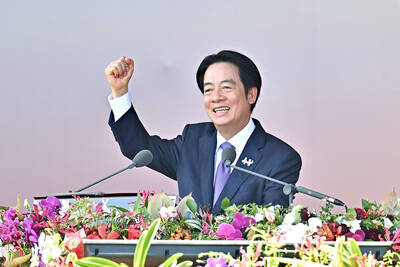A suicide car bomber killed up to 12 Iraqis, including four policemen, near a US-Iraqi base in Baghdad yesterday and gunmen killed a senior Iraqi civil servant in the second such murder in as many days.
The US-led administration has said insurgents may step up attacks before and after the occupation formally ends on June 30 to disrupt the handover and discredit Iraq's new government.
While the new bloodshed seemed to bear out that prediction, two foreign hostages, a Turk and an Egyptian, were freed after what a mediator called talks with men close to their captors.
Police at the scene of the car bombing said their colleagues had tried to stop a suspicious vehicle hurtling toward an Iraqi military college in southeast Baghdad, where many US soldiers are also based.
Abdul Razzak Kadhem, a senior police officer, said two police cars had intercepted the vehicle, which then exploded, destroying one police car and badly damaging another.
The US military, condemning what it called a "random, senseless act of violence," said the blast had killed eight Iraqi civilians and four police, and wounded 13 people.
Kadhem said earlier four policemen and two civilians had died. Four policemen were wounded.
Two charred bodies could be seen in the burnt wreckage of one police car. All that remained of the bomber's car was a blackened engine in the road. Several civilian vehicles were damaged. Blood stained the driver's seat of a white pick-up.
"One car was blown across the street," said Abdel Hasan al-Jabbar, an off-duty civil-defense worker. "The man inside had blood pouring from the top of his head."
Guerrillas frequently target police and other Iraqis whom they accuse of collaborating with the US-led occupation.
The Iraqi civil servant, Kamal al-Jarrah, 63, who headed the education ministry's cultural relations department, was shot in his garden after stepping out of his house in the western Ghazaliya district of the capital to go to work.
The veteran bureaucrat died in hospital, Abdul Khaliq al-Amiri, secretary to the education minister, said. Jarrah's wife, who was with him in the garden, was unhurt.
In a similarly precise attack on Saturday, gunmen in a car killed Bassam Qubba, the foreign ministry's undersecretary for multinational affairs and international organizations.
Last month, a suicide bombing killed Izzedin Salim, the head of Iraq's now-dissolved Governing Council, and another council member survived an ambush south of the capital.
The Foreign Ministry said Qubba's killing bore "the hallmarks of leftover supporters of Saddam Hussein's evil regime." Foreign Minister Hoshiyar Zebari said the interim government "will not be scared or intimidated by Saddamists."

The Ministry of the Interior (MOI) is to tighten rules for candidates running for public office, requiring them to declare that they do not hold a Chinese household registration or passport, and that they possess no other foreign citizenship. The requirement was set out in a draft amendment to the Enforcement Rules of the Public Officials Election and Recall Act (公職人員選舉罷免法 ) released by the ministry on Thursday. Under the proposal, candidates would need to make the declaration when submitting their registration forms, which would be published in the official election bulletin. The move follows the removal of several elected officials who were

FOUR DESIGNATED AREAS: Notices were issued for live-fire exercises in waters south and northwest of Penghu, northeast of Keelung and west of Kaohsiung, they said The military is planning three major annual exercises across the army, navy and air force this month, with the navy’s “Hai Chiang” (海強, “Sea Strong”) drills running from today through Thursday, the Ministry of National Defense said yesterday. The Hai Chiang exercise, which is to take place in waters surrounding Taiwan, would feature P-3C Orion maritime patrol aircraft and S-70C anti-submarine helicopters, the ministry said, adding that the drills aim to bolster the nation’s offshore defensive capabilities. China has intensified military and psychological pressure against Taiwan, repeatedly sending warplanes and vessels into areas near the nation’s air defense identification zone and across

SENATE RECOMMENDATION: The National Defense Authorization Act encourages the US secretary of defense to invite Taiwan’s navy to participate in the exercises in Hawaii The US Senate on Thursday last week passed the National Defense Authorization Act (NDAA) for Fiscal Year 2026, which strongly encourages the US secretary of defense to invite Taiwan’s naval forces to participate in the Rim of the Pacific (RIMPAC) exercise, as well as allocating military aid of US$1 billion for Taiwan. The bill, which authorizes appropriations for the military activities of the US Department of Defense, military construction and other purposes, passed with 77 votes in support and 20 against. While the NDAA authorizes about US$925 billion of defense spending, the Central News Agency yesterday reported that an aide of US

NATIONAL DAY: The ‘Taiwan Dome’ would form the centerpiece of new efforts to bolster air defense and be modeled after Israel’s ‘Iron Dome,’ sources said President William Lai (賴清德) yesterday pledged to strengthen the nation’s air defense capabilities and build a “T-Dome” system to create a safety net against growing military threats from China. “We will accelerate our building of the T-Dome, establish a rigorous air defense system in Taiwan with multi-layered defense, high-level detection and effective interception, and weave a safety net for Taiwan to protect the lives and property of citizens,” he said in his National Day address. In his keynote address marking the Republic of China’s (ROC) 114th anniversary, Lai said the lessons of World War II have taught nations worldwide “to ensure that